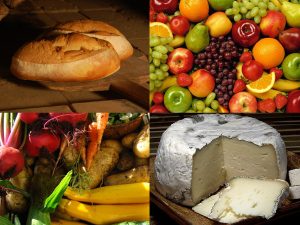Climate change and biodiversity loss can’t be ‘solved’ or even mitigated by ‘natural capitalism’. Capitalism itself is the problem, for two reasons, that can’t be stated often enough:
- It has to grow forever, and it’s the quest for eternal GDP growth that is that root cause of climate change and biodiversity loss.
- It concentrates wealth forever too, and it’s wealth concentration that makes it impossible to have true democracy, so that governments now serve concentrated wealth, not nature / people / communities – which is why we’ve had 27 years of COP meetings, followed by record carbon emissions.
Capitalists have found a new source of profit – rewilding.
We like the idea of rewilding, but it needs much more thought when it removes good UK lowland farmland – because then, obviously, land elsewhere will have to brought into agricultural production to take up the slack; and as we close down small, organic farms, more of our food will have to come from industrial agriculture or giant, capitalist factories. This is already happening on a huge scale of course, but rewilding of prime agricultural land will start to wipe out the local farms that are left. We need to think very carefully about whether this is a good idea.
Here, Simon Fairlie of The Land magazine explains how capitalist re-wilders have misrepresented land quality in order to claim very profitable government payouts.
Profit-Seeking Rewilders Misrepresent Land Quality
A consortium that has bought a large arable farm in Lincolnshire in order to rewild it, has been making misleading claims about the quality of the land it acquired. The misinformation is revealed in the latest edition of The Land magazine.1
The investment company Nattergal states that its objective is to acquire and rewild “lowland arable farms – that are ripe for ecological improvement and with lower quality soil.”
One of the investors in Nattergal is Charles Burrell, owner of Knepp, a 3000 acre estate in Sussex that has been heralded as an exemplar of lowland rewilding.
Nattergal’s first acquisition, in December 2021, was the 1500 acre Boothby Lodge Farm in Lincolnshire, where they plan to carry out a “three-year retreat from farming operations”.2
Nattergal describe Boothby Lodge on its website as a “low grade arable farm”. Such a description would help to allay fears about taking good quality land out of production.
However the sales brochure for Boothby Lodge, from the estate agents Savills, describes it as a “high quality, commercial arable farm”, and states that the land is rated Grade 3, which, according to government standards, is “good to moderate quality”.3
Moreover, Grade 3 is divided into Grade 3a which is “good” agricultural land and Grade 3b which is “moderate”. Grade 3a comes under the heading “Best and Most Versatile” agricultural land, which is given a measure of protection under the planning system.
In January 2023, The Land magazine contacted Nattergal to find out whether Boothby Lodge was Grade 3a or 3b. A spokesman for Nattergal replied: “I am afraid I can’t answer that question. I would say probably 50:50 but I am afraid that is just speculation.”
In other words, one year after acquisition, Nattergal did not know whether its land was of “good” or “moderate quality”, yet was describing it publicly as “low grade”.
The matter is important because there are concerns that taking good quality arable land out of production will undermine the UK’s food security.
Nattergal also stated that much of the land is heavy clay. However the previous owner had recently installed new land drains, which Nattergal are proposing to block up.
Boothby Lodge is expected to derive an income from carbon credits and biodiversity offsets.4 Rewilding an arable farm offers more potential profit from these sources than does rewilding a low grade pasture farm.
Simon Fairlie, co-editor of The Land magazine states:
“If this were a one-off one would not be too concerned. But we are told that Boothby Lodge is a proof of concept for further investment.4 If it proves profitable other landowners will follow suit.”
He added: “The strategy of rewilding large tracts of productive land in the UK, if it means outsourcing our food production and its environmental impact to other countries, is one we should reject.”
REFERENCES AND WEBSITE LINKS
1. The article “Natural Capitalists Target Arable” in The Land 32, February 2023, can be found here:
https://www.thelandmagazine.org.uk/articles/natural-capitalists-target-arable
2. https://www.nattergal.co.uk/boothby-wildland
3. https://assets.savills.com/properties/GBLHRALAR190016/LAR190016_LIR19000411.PDF
4. https://rural.struttandparker.com/topic/biodiversity/
FOR MORE INFORMATION CONTACT:
Simon Fairlie : editorial@thelandmagazine.org.uk












1 Comment
Simon Fairlie for PM!